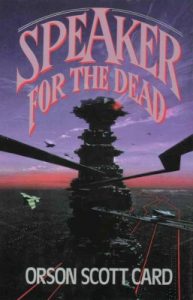Card, O. S. (1986). Speaker for the Dead. Tor Books.

I had very fond memories of reading Card’s Ender’s Game as a pre-teen, so I was very excited to dive into the sequel, which also won the Nebula Award (1986) and the Hugo Award (1987). For those of you who’ve read Ender’s Game, this sequel is set about 3,000 years after a human starfleet under Ender’s direction essentially wiped out an advanced ant-like race of aliens known as the “Buggers” (more on that later). Humans have spread out across the galaxy in colonies, and Ender himself is only middle-aged because of frequent near-light speed travel between these colonies. Among most humans, he is now reviled throughout the galaxy as “Ender the Xenocide,” though few know that he is still alive and is also the founder of a popular religious movement which emphasizes candidly and empathetically speaking about those who have died. He is called to Lusitania, a Portugese Catholic colony planet, to “speak the deaths” of two Xenologists who have been inexplicably murdered by the “Piggies,” an otherwise amicable pig-like intelligent alien species native to the planet. Unlike Ender’s Game, this book is much more interested in questions of xenobiology and religion than those of conquest or war. It ends up reading a bit like a detective story as Ender unravels the secrets of complex social and biological networks which Card has cleverly designed.
I’ve read online that Card, a Mormon, has a long history of homophobic remarks. While I don’t doubt these charges, I must admit that I find them hard to square with the compassion that exudes from this novel. Ender, the clear hero of this story, redeems himself from his near-genocide by restarting a community of the “Buggers” on Lusitania. He is at his best as he adeptly breaks through the skeptical walls of everyone from Catholic priests to Piggies to the ansible-distributed AI whom he considers his best friend. This is sophisticated science fiction written with a loving and wise touch. While its author is certainly flawed, I’d still strongly recommend this book, particularly if you enjoyed Ender’s Game.

This is so interesting to read, Evan. Thank you! I appreciate your point about how Card employs compassion in his works–he does–and I, too, have found it hard to square with his homophobic remarks. I also wish he didn’t use names like “Piggies” and “Buggers,” ugh. But the Ender’s series is quite brilliant and excellent SF. I need to think more about the ansible-distributed-AI character (I read this long ago!).